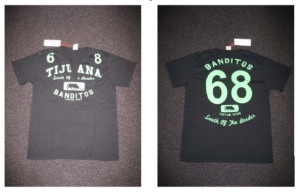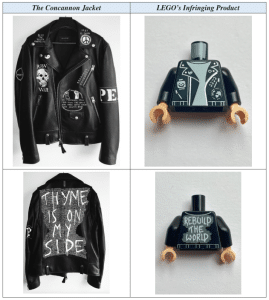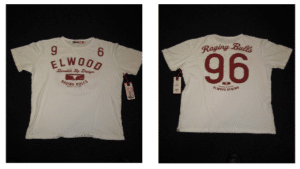lego sued for copyright infringement over queer eye jacket
If you haven’t already heard, Lego’s business is going gangbusters. In the 2020 financial year, sales rose 13% to AU$9.04 billion, while profits jumped 19%. That profit growth is partly driven by the fact that many consider Lego to be an excellent financial investment, with annual appreciation of 11% apparently exceeding many stocks and commodities.
I have to say – I’ve been a massive Lego fan since childhood. Fatherhood now gives me a plausible excuse for wandering down the Lego aisle, even if the realisation that my toddler would wreck any builds (usually) provides a sufficient disincentive to buying anything.
licensed lego products
Alongside its traditional themes such as city, castle and space, Lego has also been busy producing a wide range of licensed products. Star Wars and Harry Potter have long been staples of the Lego line-up, alongside amazing vehicles like the Bugatti Chiron or BMW R1200GS.
A more recent trend has been licensed sets implementing sets from a wide range of classic and current television shows. Be that Doctor Who (as a Whovian, I do have this one), Stranger Things or Friends.
queer eye trouble
It appears that Lego has now hit a snag over one of its latest sets, which licenses the Queer Eye television program. The new set includes a reproduction of a leather jacket that was custom-made for cast member Antoni Porowski by designer James Concannon. Apparently, Mr Concannon has now filed a suit against Lego for copyright infringement in the US District Court for the District of Connecticut in relation to that jacket.
The jacket as contained in the Lego set is not identical to Mr Concannon’s design, as these images from the Court documents show:
However, it is alleged that the Lego jacket copies “the unique placement, coordination, and arrangement of the individual artistic elements” of the jacket.
how would an australian court deal with the lego dispute?
As Mr Concannon’s lawsuit has been brought under US law, I will leave direct comment to those who are experts in US copyright law. My interest is: how would an Australian court deal with such a suit, especially given that the Queer Eye set is currently sold in Australia?
If Mr Concannon’s jacket has indeed been reproduced without his consent, then it is likely that an Australian court would find in his favour. Copyright infringement requires that there be an original work in which copyright exists, and that a substantial part of that original work has been reproduced without consent. While the imagery on the Lego jacket is different in detail to Mr Concannon’s original, this is pretty much exactly the same situation when Cotton On Clothing was alleged to have infringed the copyright of Elwood Clothing’s t-shirt design.
Here is Elwood’s design, followed by one of Cotton On’s:

On appeal before the Full Court of the Federal Court of Australia in 2008, the Court found that (at para 76):
“[T]he layout and the elements referred to by her Honour that gave rise to the “look and feel” and resulted in the creation of an artistic work were matters of expression, not merely matters of idea or concept. The look and feel arose from the selection, arrangement and style of the elements regarded as a whole”
The Full Court found that Cotton On took Elwood’s layout, its selection, arrangement and style, with the intention of creating the same look and feel. Importantly the court held (at para 78):
“Even though the logo and numbers were different, by taking the layout and other elements of expression that created the desired “look and feel”, Cotton On took a substantial part of the copyright work.”
It is difficult to imagine that an Australian court would treat Mr Concannon’s claim any differently.
fair use defence?
Importantly, while US copyright law includes a general “fair use” exemption that might protect Lego, Australia’s Copyright Act 1968 does not. Instead, Australia still relies on a number of specific exemptions, notwithstanding the 2016 recommendation of the Productivity Commission in its final Inquiry Report on Intellectual Property Arrangements to adopt a “fair use” exemption.
the take-away
If you are going to reproduce another person’s copyright work, whether that is a facsimile reproduction or a reproduction of the “look and feel”, you need to consider whether this is going to infringe copyright. Malicious intent is not relevant to the question of infringement, only to the quantum of damages.
If in doubt, you should seek advice from the Macpherson Kelley IP team. And if you’re an adult and want to buy a Lego set, you no longer need to lie and claim that it’s for a kid.
The information contained in this article is general in nature and cannot be relied on as legal advice nor does it create an engagement. Please contact one of our lawyers listed above for advice about your specific situation.
more
insights
Implied contract terms: Court of Appeal confirms no implied right for hospital to terminate long term emergency services agreement
Bunnings faces off against the Privacy Commissioner over facial recognition technology
Navigating Australia’s new trade mark regulations
stay up to date with our news & insights
lego sued for copyright infringement over queer eye jacket
If you haven’t already heard, Lego’s business is going gangbusters. In the 2020 financial year, sales rose 13% to AU$9.04 billion, while profits jumped 19%. That profit growth is partly driven by the fact that many consider Lego to be an excellent financial investment, with annual appreciation of 11% apparently exceeding many stocks and commodities.
I have to say – I’ve been a massive Lego fan since childhood. Fatherhood now gives me a plausible excuse for wandering down the Lego aisle, even if the realisation that my toddler would wreck any builds (usually) provides a sufficient disincentive to buying anything.
licensed lego products
Alongside its traditional themes such as city, castle and space, Lego has also been busy producing a wide range of licensed products. Star Wars and Harry Potter have long been staples of the Lego line-up, alongside amazing vehicles like the Bugatti Chiron or BMW R1200GS.
A more recent trend has been licensed sets implementing sets from a wide range of classic and current television shows. Be that Doctor Who (as a Whovian, I do have this one), Stranger Things or Friends.
queer eye trouble
It appears that Lego has now hit a snag over one of its latest sets, which licenses the Queer Eye television program. The new set includes a reproduction of a leather jacket that was custom-made for cast member Antoni Porowski by designer James Concannon. Apparently, Mr Concannon has now filed a suit against Lego for copyright infringement in the US District Court for the District of Connecticut in relation to that jacket.
The jacket as contained in the Lego set is not identical to Mr Concannon’s design, as these images from the Court documents show:
However, it is alleged that the Lego jacket copies “the unique placement, coordination, and arrangement of the individual artistic elements” of the jacket.
how would an australian court deal with the lego dispute?
As Mr Concannon’s lawsuit has been brought under US law, I will leave direct comment to those who are experts in US copyright law. My interest is: how would an Australian court deal with such a suit, especially given that the Queer Eye set is currently sold in Australia?
If Mr Concannon’s jacket has indeed been reproduced without his consent, then it is likely that an Australian court would find in his favour. Copyright infringement requires that there be an original work in which copyright exists, and that a substantial part of that original work has been reproduced without consent. While the imagery on the Lego jacket is different in detail to Mr Concannon’s original, this is pretty much exactly the same situation when Cotton On Clothing was alleged to have infringed the copyright of Elwood Clothing’s t-shirt design.
Here is Elwood’s design, followed by one of Cotton On’s:

On appeal before the Full Court of the Federal Court of Australia in 2008, the Court found that (at para 76):
“[T]he layout and the elements referred to by her Honour that gave rise to the “look and feel” and resulted in the creation of an artistic work were matters of expression, not merely matters of idea or concept. The look and feel arose from the selection, arrangement and style of the elements regarded as a whole”
The Full Court found that Cotton On took Elwood’s layout, its selection, arrangement and style, with the intention of creating the same look and feel. Importantly the court held (at para 78):
“Even though the logo and numbers were different, by taking the layout and other elements of expression that created the desired “look and feel”, Cotton On took a substantial part of the copyright work.”
It is difficult to imagine that an Australian court would treat Mr Concannon’s claim any differently.
fair use defence?
Importantly, while US copyright law includes a general “fair use” exemption that might protect Lego, Australia’s Copyright Act 1968 does not. Instead, Australia still relies on a number of specific exemptions, notwithstanding the 2016 recommendation of the Productivity Commission in its final Inquiry Report on Intellectual Property Arrangements to adopt a “fair use” exemption.
the take-away
If you are going to reproduce another person’s copyright work, whether that is a facsimile reproduction or a reproduction of the “look and feel”, you need to consider whether this is going to infringe copyright. Malicious intent is not relevant to the question of infringement, only to the quantum of damages.
If in doubt, you should seek advice from the Macpherson Kelley IP team. And if you’re an adult and want to buy a Lego set, you no longer need to lie and claim that it’s for a kid.









